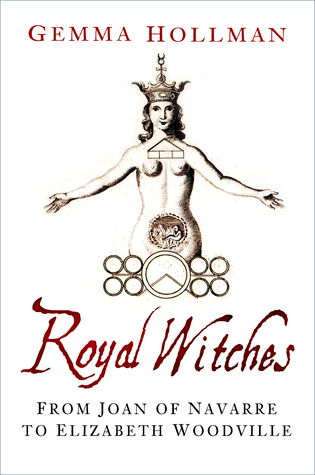
Blurb
Until the mass hysteria of the seventeenth century, accusations of witchcraft in England were rare. However, four royal women, related in family and in court ties – Joan of Navarre, Eleanor Cobham, Jacquetta of Luxembourg and Elizabeth Woodville – were accused of practising witchcraft in order to kill or influence the king.
Some of these women may have turned to the dark arts, but the purpose of the accusations was purely political. Despite their status, these women were vulnerable because of their gender as the men around them moved them like pawns for political gains.
In Royal Witches, Gemma Hollman explores the lives and the cases of these so-called witches. In a time when the line between science and magic was blurred, these trials offer a tantalising insight of how malicious magic would be used and cause such mass hysteria in centuries to come.
My Review
Naturally, although it would not be a snappy title at all, this book would more appropriately be called “Royal Ladies Unjustly Accused of Witchcraft”. Only two of the four women accused were actually queens, and the accusation against Elizabeth Woodville was half-hearted at best. But we certainly get the idea. Charging a highly-placed woman of witchcraft was an easy political bludgeon, not even requiring much proof—or any, really. Our first victim, the dowager queen Joan of Navarre, was given an honorable imprisonment and a generous annuity. She wasn’t tried in court nor was she convicted of anything; it was her misfortune that her step-son Henry V was in desperate need of funds to pursue his French war. And she was a wealthy woman. He even cleared her name on his deathbed. But the lesson was obvious to all, and the next time the ploy was used—against Eleanor Cobham, Duchess of Gloucester—the real target was her husband:
She had been found guilty of using witchcraft by the bishops of the King’s Council, but as previously seen, this was not an offence worthy of death, especially when she had only confessed to using love magic. If anything, she should have been let off with a warning (and perhaps a hefty fine befitting her rank) and then released. Of course, this would not do for Humphrey’s enemies; they needed her completely destroyed.
Poor Eleanor survived, but her life and her husband’s life were ruined. The next two accused witches, Jacquetta and Elizabeth Woodville, were mother and daughter. Their stories were intimately connected with the Wars of the Roses, and much of the book gives us a brief history of the conflict and their involvement with Edward IV. I would think that witchcraft was not a major factor in their history, but it certainly does come into play. In fact, throughout, witchcraft plays “second fiddle” to the real story, which is the attempt of powerful men to destroy their enemies through insinuation, unfounded accusations, and manipulation of the law.

Amazon:
https://www.amazon.com/gp/product/0750989408